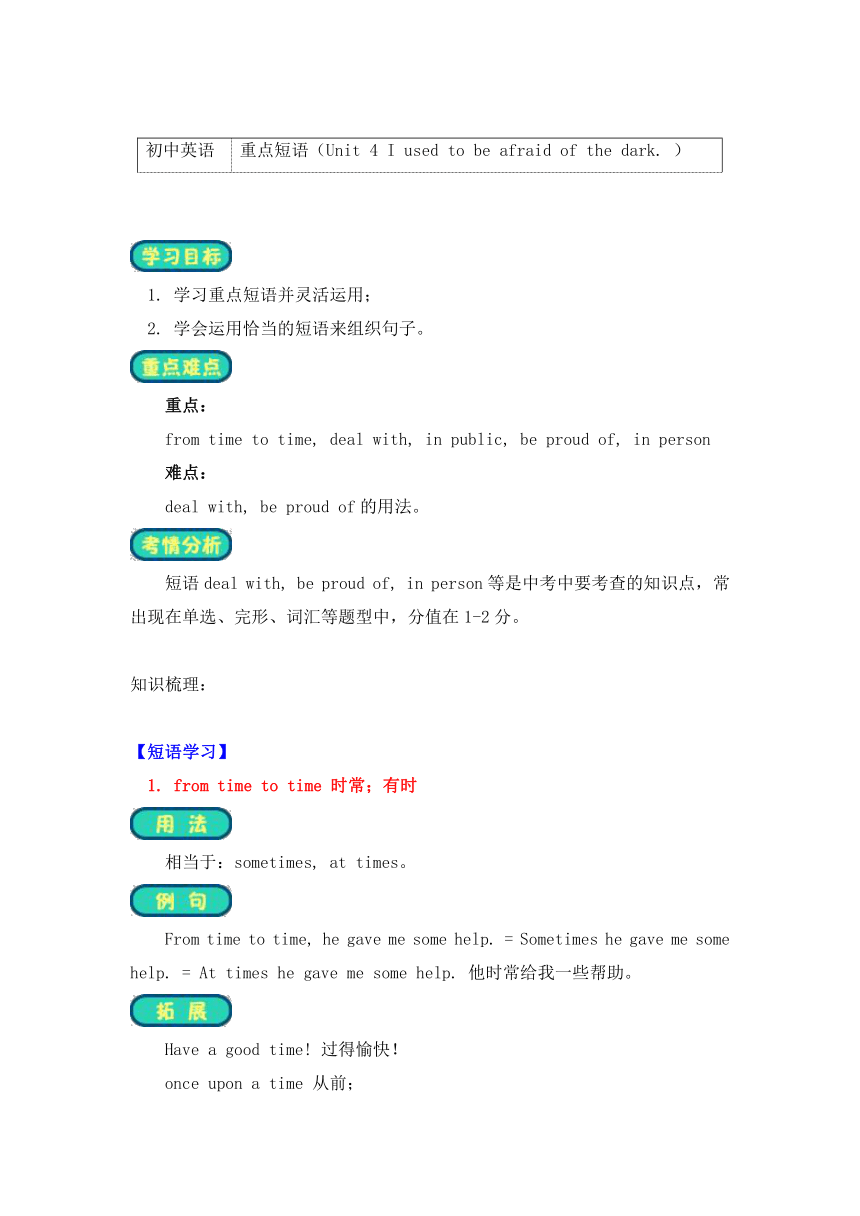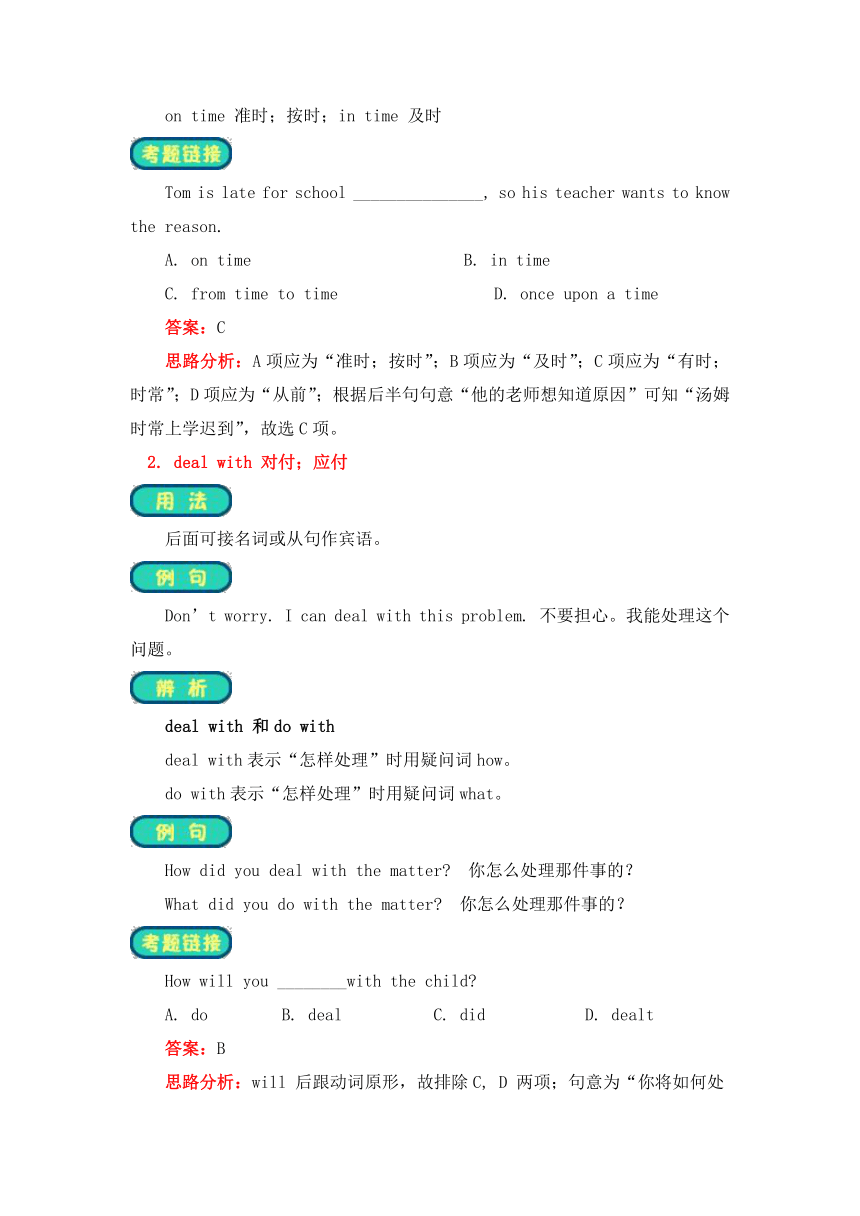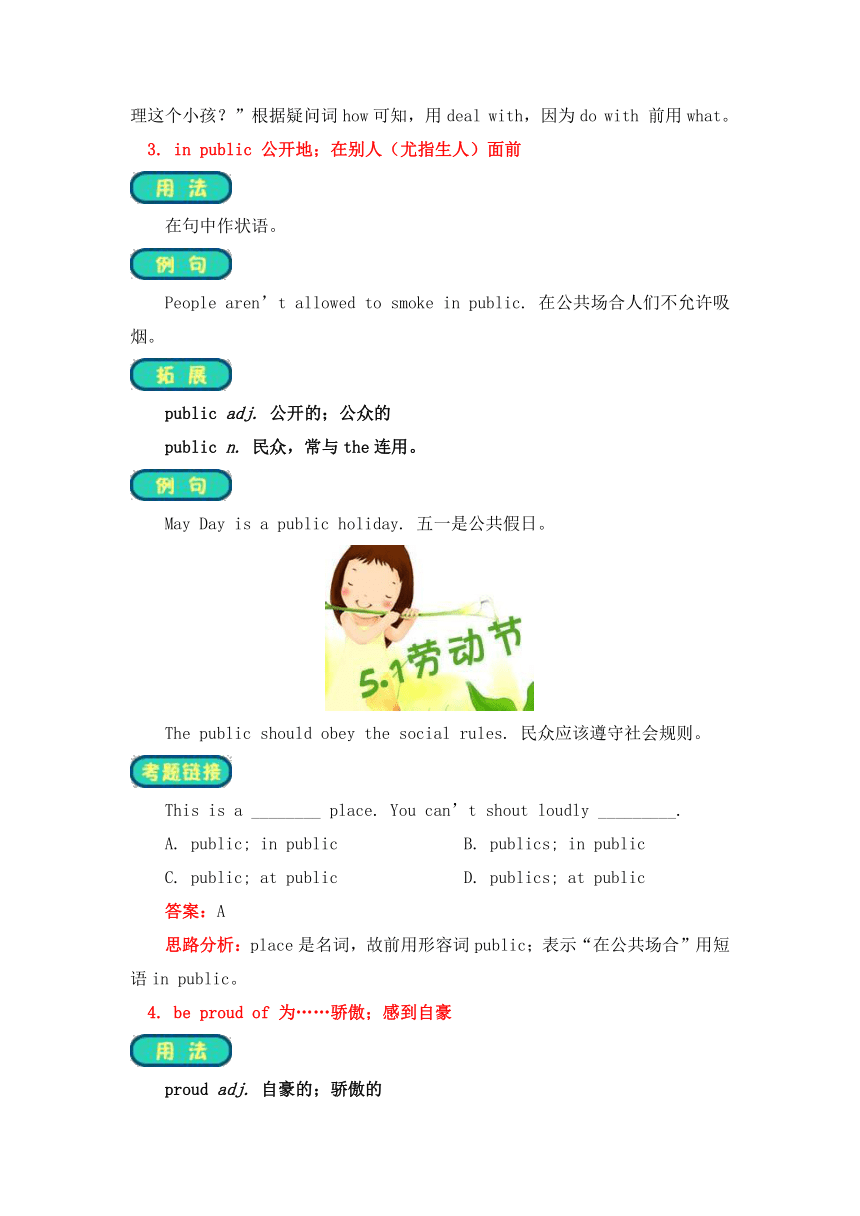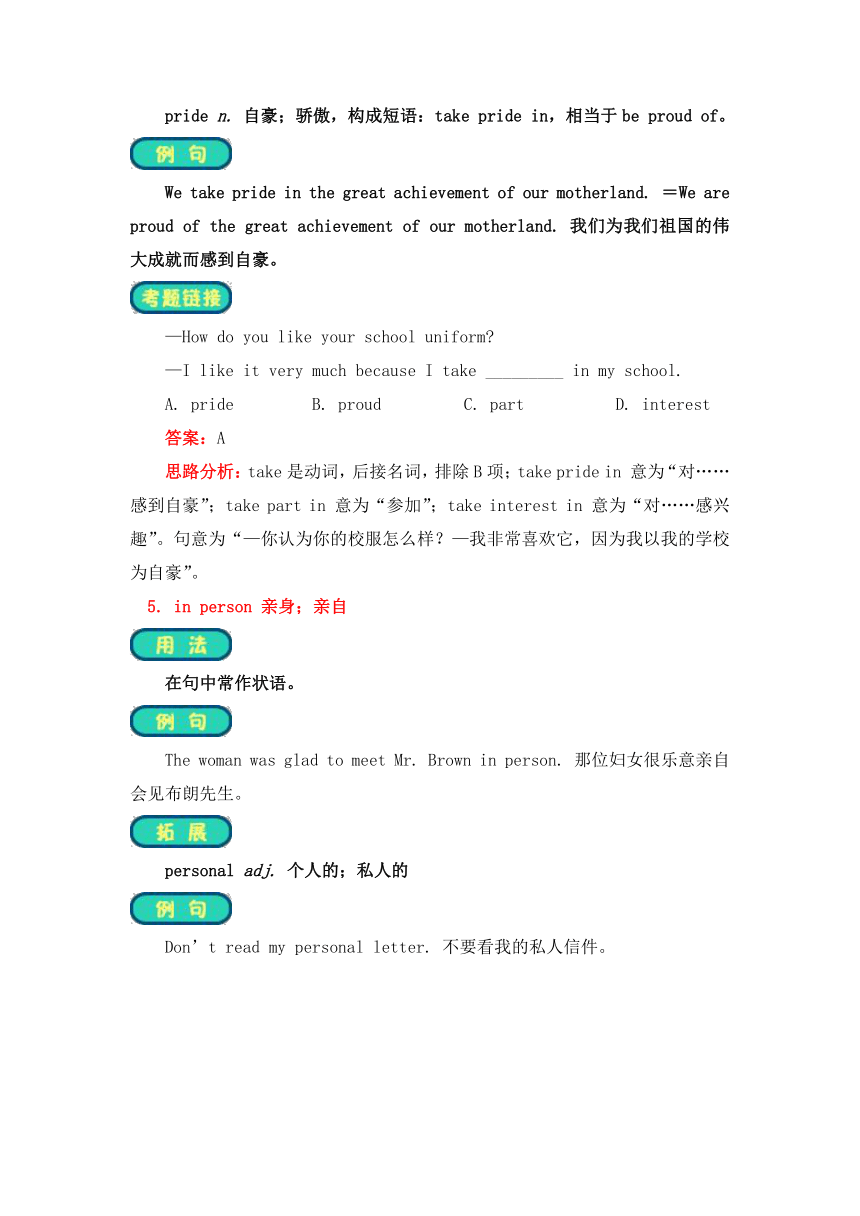人教新目标版英语九年级全Unit 4 I used to be afraid of the dark.重点短语导学案及练习(含答案及解析)
文档属性
| 名称 | 人教新目标版英语九年级全Unit 4 I used to be afraid of the dark.重点短语导学案及练习(含答案及解析) |

|
|
| 格式 | doc | ||
| 文件大小 | 201.9KB | ||
| 资源类型 | 教案 | ||
| 版本资源 | 人教新目标(Go for it)版 | ||
| 科目 | 英语 | ||
| 更新时间 | 2020-09-21 21:07:55 | ||
图片预览




文档简介
初中英语 重点短语(Unit 4 I used to be afraid of the dark. )
1. 学习重点短语并灵活运用;
2. 学会运用恰当的短语来组织句子。
重点:
from time to time, deal with, in public, be proud of, in person
难点:
deal with, be proud of的用法。
短语deal with, be proud of, in person等是中考中要考查的知识点,常出现在单选、完形、词汇等题型中,分值在1-2分。
知识梳理:
【短语学习】
1. from time to time 时常;有时
相当于:sometimes, at times。
From time to time, he gave me some help. = Sometimes he gave me some help. = At times he gave me some help. 他时常给我一些帮助。
Have a good time! 过得愉快!
once upon a time 从前;
on time 准时;按时;in time 及时
Tom is late for school _______________, so his teacher wants to know the reason.
A. on time B. in time
C. from time to time D. once upon a time
答案:C
思路分析:A项应为“准时;按时”;B项应为“及时”;C项应为“有时;时常”;D项应为“从前”;根据后半句句意“他的老师想知道原因”可知“汤姆时常上学迟到”,故选C项。
2. deal with 对付;应付
后面可接名词或从句作宾语。
Don’t worry. I can deal with this problem. 不要担心。我能处理这个问题。
deal with 和do with
deal with表示“怎样处理”时用疑问词how。
do with表示“怎样处理”时用疑问词what。
How did you deal with the matter? 你怎么处理那件事的?
What did you do with the matter? 你怎么处理那件事的?
How will you ________with the child?
A. do B. deal C. did D. dealt
答案:B
思路分析:will 后跟动词原形,故排除C, D 两项;句意为“你将如何处理这个小孩?”根据疑问词how可知,用deal with,因为do with 前用what。
3. in public 公开地;在别人(尤指生人)面前
在句中作状语。
People aren’t allowed to smoke in public. 在公共场合人们不允许吸烟。
public adj. 公开的;公众的
public n. 民众,常与the连用。
May Day is a public holiday. 五一是公共假日。
The public should obey the social rules. 民众应该遵守社会规则。
This is a ________ place. You can’t shout loudly _________.
A. public; in public B. publics; in public
C. public; at public D. publics; at public
答案:A
思路分析:place是名词,故前用形容词public;表示“在公共场合”用短语in public。
4. be proud of 为……骄傲;感到自豪
proud adj. 自豪的;骄傲的
pride n. 自豪;骄傲,构成短语:take pride in,相当于be proud of。
We take pride in the great achievement of our motherland. =We are proud of the great achievement of our motherland. 我们为我们祖国的伟大成就而感到自豪。
—How do you like your school uniform?
—I like it very much because I take _________ in my school.
A. pride B. proud C. part D. interest
答案:A
思路分析:take是动词,后接名词,排除B项;take pride in 意为“对……感到自豪”;take part in 意为“参加”;take interest in 意为“对……感兴趣”。句意为“—你认为你的校服怎么样?—我非常喜欢它,因为我以我的学校为自豪”。
5. in person 亲身;亲自
在句中常作状语。
The woman was glad to meet Mr. Brown in person. 那位妇女很乐意亲自会见布朗先生。
personal adj. 个人的;私人的
Don’t read my personal letter. 不要看我的私人信件。
I’m sorry I can’t go to the party __________ tonight.
A. to person B. in person C. personal D. persons
答案:B
思路分析:C项是形容词,其后接名词形式,与题干不符;D项是名词复数,不合句意;A项短语错误;故选B项。句意为“很抱歉今晚我不能亲自去参加聚会了。”
1. I don’t know what you can do with the problem. (改为同义句)
I don’t know ______ you can ______ ______ the problem.
2. Sometimes I am late for school. (改为同义句)
______ ______ ______ ______ I am late for school.
3. Don’t spit in public places. (改为同义句)
Don’t spit ______ _______.
4. The mother is proud of her son. (改为同义句)
The mother ______ ______ ______her son.
5. His father walked for one hour and came to see him ______(亲自).
答案:1. how; deal with 2. From time to time 3. in public
4. takes pride in 5. in person
同步练习:
(答题时间:15分钟)
Ⅰ. 单项选择
1. —Tom, don’t talk with your deskmate. Please ______ what I’m saying.
—I’m sorry, Miss Zhao.
A. do well in B. pass on C. pay attention to D. look through
2. How can you deal _______ the boy? He is always absent ______ school.
A. to; in B. with; from C. in; on D. with; at
3. As Chinese, we take pride _______ Li Na, an outstanding tennis player.
A. on B. for C. of D. in
Ⅱ. 根据括号内的汉语提示写出英语句子,每空一词
1. He used to ______ _______ _______ (对……感到自豪) his success.
2. My mother takes care of me ______ _______(亲自) every day.
3. If you want to be successful, you should keep trying and ______ ______ ______ (从不放弃).
4.You should ______ ______ ______ _______(对……更专心) your study instead of watching too much TV.
5. ______ _______ ______ ______ (即使你憎恨) to do it, you have to do it.
Ⅲ. 阅读理解
“Depend on yourself” is what nature says to every man. Parents can help you. Teachers can help you. Others still can help you. But all these only help you to help yourself.
There have been many great men in history. But many of them were very poor in childhood, and had no uncles, aunts or friends to help them. They couldn’t depend on them for education. They saw it was, and began to work with their efforts. To know something, they worked their own way up to fame (荣誉).
One of the most famous teachers in England used to tell his pupil, “I can’t make worthy men of you, but I can help you make men of yourselves.”
Some young men are the best in anything, and they are so be pitied (值得同情的). They can never do things successfully if they don’t see their weak points and change their courses (做法). They are nothing now, and will be nothing as long as they live if they don’t follow the advice of their parents and teachers, and depend on their own efforts.
1. “Depend on yourself” in this passage means ___________.
A. depend on your own efforts???? B. depend on nature
C. wait for others to help????? D. depend on your parents
2. Many of the great men in history succeeded because ____________.
A. they were very poor in childhood????????????
B. they could not depend on schools for an education
C. they made great efforts to learn and work??
D. they wanted very much to become famous
*3. According to the famous teacher in England, a teacher can _________.
A. make his pupil worthy men????????????????????
B. teach his pupils everything he knows
C. help his pupils make themselves useful men???????
D. make his pupils men of strength and courage
4. If young people depend on their own efforts, ___________.
A. they are to be pitied??????????????????????????????????
B. they can never be successful
C. they are nothing now and will be nothing in the future???????
D. they can be successful in their work
*5. The main idea of the passage is that ___________.
A. we should depend on our parents and teachers
B. we can depend on our friends and relatives
C. all great men in history were poor when they were young
D. we can’t depend on our parents or teachers, but we can get advice from them
答案:
Ⅰ. 1. C 解析:A项意为“擅长”;B项意为“传递”;C项意为“注意”;D项意为“浏览”;根据答语“抱歉,赵老师”可知“请注意我讲的”。
2. B 解析:deal with意为“对付;应付”;absent from意为“缺席”,符合短语搭配。
3. D 解析:take pride in是固定短语,意为“为……而自豪”。
Ⅱ. 1. take pride in / be proud of 2. in person 3. never give up 4. pay more attention to
5. Even though/ if you hate
Ⅲ. 1. A 解析:“靠你自己”即“靠你自己的努力”。
2. C 解析:根据第二段后两句可知。
3. C 解析:根据第三段的句子I can’t make worthy men of you, but I can help you make men of yourselves.可知。
4. D 解析:根据第四段最后一句可知。
5. D 解析:本文阐述了“依靠自己”才能真正成功,故只有D项合适。
1. 学习重点短语并灵活运用;
2. 学会运用恰当的短语来组织句子。
重点:
from time to time, deal with, in public, be proud of, in person
难点:
deal with, be proud of的用法。
短语deal with, be proud of, in person等是中考中要考查的知识点,常出现在单选、完形、词汇等题型中,分值在1-2分。
知识梳理:
【短语学习】
1. from time to time 时常;有时
相当于:sometimes, at times。
From time to time, he gave me some help. = Sometimes he gave me some help. = At times he gave me some help. 他时常给我一些帮助。
Have a good time! 过得愉快!
once upon a time 从前;
on time 准时;按时;in time 及时
Tom is late for school _______________, so his teacher wants to know the reason.
A. on time B. in time
C. from time to time D. once upon a time
答案:C
思路分析:A项应为“准时;按时”;B项应为“及时”;C项应为“有时;时常”;D项应为“从前”;根据后半句句意“他的老师想知道原因”可知“汤姆时常上学迟到”,故选C项。
2. deal with 对付;应付
后面可接名词或从句作宾语。
Don’t worry. I can deal with this problem. 不要担心。我能处理这个问题。
deal with 和do with
deal with表示“怎样处理”时用疑问词how。
do with表示“怎样处理”时用疑问词what。
How did you deal with the matter? 你怎么处理那件事的?
What did you do with the matter? 你怎么处理那件事的?
How will you ________with the child?
A. do B. deal C. did D. dealt
答案:B
思路分析:will 后跟动词原形,故排除C, D 两项;句意为“你将如何处理这个小孩?”根据疑问词how可知,用deal with,因为do with 前用what。
3. in public 公开地;在别人(尤指生人)面前
在句中作状语。
People aren’t allowed to smoke in public. 在公共场合人们不允许吸烟。
public adj. 公开的;公众的
public n. 民众,常与the连用。
May Day is a public holiday. 五一是公共假日。
The public should obey the social rules. 民众应该遵守社会规则。
This is a ________ place. You can’t shout loudly _________.
A. public; in public B. publics; in public
C. public; at public D. publics; at public
答案:A
思路分析:place是名词,故前用形容词public;表示“在公共场合”用短语in public。
4. be proud of 为……骄傲;感到自豪
proud adj. 自豪的;骄傲的
pride n. 自豪;骄傲,构成短语:take pride in,相当于be proud of。
We take pride in the great achievement of our motherland. =We are proud of the great achievement of our motherland. 我们为我们祖国的伟大成就而感到自豪。
—How do you like your school uniform?
—I like it very much because I take _________ in my school.
A. pride B. proud C. part D. interest
答案:A
思路分析:take是动词,后接名词,排除B项;take pride in 意为“对……感到自豪”;take part in 意为“参加”;take interest in 意为“对……感兴趣”。句意为“—你认为你的校服怎么样?—我非常喜欢它,因为我以我的学校为自豪”。
5. in person 亲身;亲自
在句中常作状语。
The woman was glad to meet Mr. Brown in person. 那位妇女很乐意亲自会见布朗先生。
personal adj. 个人的;私人的
Don’t read my personal letter. 不要看我的私人信件。
I’m sorry I can’t go to the party __________ tonight.
A. to person B. in person C. personal D. persons
答案:B
思路分析:C项是形容词,其后接名词形式,与题干不符;D项是名词复数,不合句意;A项短语错误;故选B项。句意为“很抱歉今晚我不能亲自去参加聚会了。”
1. I don’t know what you can do with the problem. (改为同义句)
I don’t know ______ you can ______ ______ the problem.
2. Sometimes I am late for school. (改为同义句)
______ ______ ______ ______ I am late for school.
3. Don’t spit in public places. (改为同义句)
Don’t spit ______ _______.
4. The mother is proud of her son. (改为同义句)
The mother ______ ______ ______her son.
5. His father walked for one hour and came to see him ______(亲自).
答案:1. how; deal with 2. From time to time 3. in public
4. takes pride in 5. in person
同步练习:
(答题时间:15分钟)
Ⅰ. 单项选择
1. —Tom, don’t talk with your deskmate. Please ______ what I’m saying.
—I’m sorry, Miss Zhao.
A. do well in B. pass on C. pay attention to D. look through
2. How can you deal _______ the boy? He is always absent ______ school.
A. to; in B. with; from C. in; on D. with; at
3. As Chinese, we take pride _______ Li Na, an outstanding tennis player.
A. on B. for C. of D. in
Ⅱ. 根据括号内的汉语提示写出英语句子,每空一词
1. He used to ______ _______ _______ (对……感到自豪) his success.
2. My mother takes care of me ______ _______(亲自) every day.
3. If you want to be successful, you should keep trying and ______ ______ ______ (从不放弃).
4.You should ______ ______ ______ _______(对……更专心) your study instead of watching too much TV.
5. ______ _______ ______ ______ (即使你憎恨) to do it, you have to do it.
Ⅲ. 阅读理解
“Depend on yourself” is what nature says to every man. Parents can help you. Teachers can help you. Others still can help you. But all these only help you to help yourself.
There have been many great men in history. But many of them were very poor in childhood, and had no uncles, aunts or friends to help them. They couldn’t depend on them for education. They saw it was, and began to work with their efforts. To know something, they worked their own way up to fame (荣誉).
One of the most famous teachers in England used to tell his pupil, “I can’t make worthy men of you, but I can help you make men of yourselves.”
Some young men are the best in anything, and they are so be pitied (值得同情的). They can never do things successfully if they don’t see their weak points and change their courses (做法). They are nothing now, and will be nothing as long as they live if they don’t follow the advice of their parents and teachers, and depend on their own efforts.
1. “Depend on yourself” in this passage means ___________.
A. depend on your own efforts???? B. depend on nature
C. wait for others to help????? D. depend on your parents
2. Many of the great men in history succeeded because ____________.
A. they were very poor in childhood????????????
B. they could not depend on schools for an education
C. they made great efforts to learn and work??
D. they wanted very much to become famous
*3. According to the famous teacher in England, a teacher can _________.
A. make his pupil worthy men????????????????????
B. teach his pupils everything he knows
C. help his pupils make themselves useful men???????
D. make his pupils men of strength and courage
4. If young people depend on their own efforts, ___________.
A. they are to be pitied??????????????????????????????????
B. they can never be successful
C. they are nothing now and will be nothing in the future???????
D. they can be successful in their work
*5. The main idea of the passage is that ___________.
A. we should depend on our parents and teachers
B. we can depend on our friends and relatives
C. all great men in history were poor when they were young
D. we can’t depend on our parents or teachers, but we can get advice from them
答案:
Ⅰ. 1. C 解析:A项意为“擅长”;B项意为“传递”;C项意为“注意”;D项意为“浏览”;根据答语“抱歉,赵老师”可知“请注意我讲的”。
2. B 解析:deal with意为“对付;应付”;absent from意为“缺席”,符合短语搭配。
3. D 解析:take pride in是固定短语,意为“为……而自豪”。
Ⅱ. 1. take pride in / be proud of 2. in person 3. never give up 4. pay more attention to
5. Even though/ if you hate
Ⅲ. 1. A 解析:“靠你自己”即“靠你自己的努力”。
2. C 解析:根据第二段后两句可知。
3. C 解析:根据第三段的句子I can’t make worthy men of you, but I can help you make men of yourselves.可知。
4. D 解析:根据第四段最后一句可知。
5. D 解析:本文阐述了“依靠自己”才能真正成功,故只有D项合适。
同课章节目录
- Unit 1 How can we become good learners.
- Section A
- Section B
- Unit 2 I think that mooncakes are delicious!
- Section A
- Section B
- Unit 3 Could you please tell me where the restroom
- Section A
- Section B
- Unit 4 I used to be afraid of the dark.
- Section A
- Section B
- Unit 5 What are the shirts made of?
- Section A
- Section B
- Review of Units 1-5
- Unit 6 When was it invented?
- Section A
- Section B
- Unit 7 Teenagers should be allowed to choose their
- Section A
- Section B
- Unit 8 It must belong to Carla.
- Section A
- Section B
- Unit 9 I like music that I can dance to.
- Section A
- Section B
- Unit 10 You're supposed to shake hands.
- Section A
- Section B
- Review of Units 6-10
- Unit 11 Sad movies make me cry.
- Section A
- Section B
- Unit 12 Life is full of the unexpected
- Section A
- Section B
- Unit 13 We're trying to save the earth!
- Section A
- Section B
- Unit 14 I remember meeting all of you in Grade 7.
- Section A
- Section B
- Review of Units 11-14
